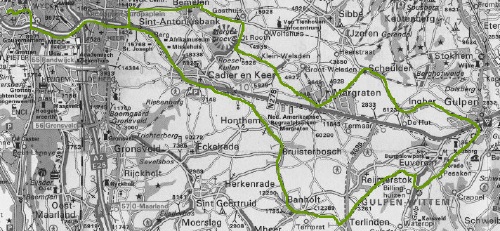Haven’t been blogging so much lately — at least not here. So I sort of feel that I have to update you (invisible readers) on my activities. Thing is that I’m feeling the pressure of the nearing end of my stay at the Jan van Eyck Academy. I’d like to leave here with 2 nice finished articles and, well, a some sort of ‘grouping’ of all the other stuff I’ve done/published here. (Like, for instance the bits & pieces on this blog, the many quotes I’ve gathered et cetera).
Now I am very very bad at organizing my own research, organizing my ‘findings’, thoughts, everything that comes before actually writing an article. If the preferred outcome is a text of say 1500 words, there’s no problem (I can do that relying on what’s in my head). If the outcome is a presentation, I have no problem at all: I’m not afraid to speaking in public and when speaking the words will roll out of my mouth. I have a scenario in my head, a rough form & direction and I can freely improvise around that. I love to do that.
(I’m afraid this is actually one of my weaknesses, since it enables me to do presentations without ever actually writing down my thoughts and theories beforehand, or for that matter, afterwards. Which means I’m left with, well, nothing definite & if I’m asked to come up with a paper afterwards I have a lot of work to do.) (Whoever cares for exact references in a talk?)
Well, so I have some very nice deadlines coming up:
Coming wednesday I’ll do a presentation at the Mediamatic RFID Workshop. I’m quite excited since Julian Bleecker will be speaking after me: http://www.mediamatic.net/artefact-11944-en.html. (I hope my bio is updated, since it came out scrambled after a translation process — ah, yes, it’s updated). Also I’m looking forward to being in a more media/technology minded environment for a few days.
On wednesday 29th of November I will do a public lecture at the Frank Mohr Institute in Groningen – that one will basically be an outline/summary of the research of the past year. It’s part of the series “Future’s Past: Re-Imagining Art & Media”: 15.00-17.00 Singelzaal, Radesingel 6, Groningen.
Well, and then there are the texts I’d like to write.
So, I decided to get organized. I gathered everything that I had saved in some form or another since january (webpages, quotes and remarks and sketches in rtf- and voodoopad-files, images, pdfs, print-outs, photocopies, and: the Ubiscribe POD plus this blog), sifted and put everything that I will use in one folder, all the text in one Voodoopad document. Partly this was procrastination, or it felt like it because it took much longer than I had expected. This time I made a point of registering the references; so I’m sort of halfway with a nice bibliography (still have to include some books). It is nice work. It feels like ‘working’. It’s clear what has to be done. (Unlike writing a text [as in: putting sentences in the right order]).
I also gathered all the screenshots (of using various blogging softwares for instance), organized them and made some that I was missing. Again: material to use.
I decided that I wanted to have handy the statistics – how many blogs there are (Sifry’s Technorati-statistics), what softwares are most used, et cetera. There are some good academic papers on that. I have, if I remember well now without looking at my Voodoopadfile, 4 different statistics of blogsoftware-use, and they vary so much that they render each other (almost) meaningless when compared. (And 3 of these researches are conducted in the proper scientific way, and in the same year). The researches do not say much about ‘blogging in general’,. They say something about blogging in the chosen sample, but what they state is quite general… Funny enough that makes my own simple not too proper scientific research (counting 204 blogs from my own environment) more significant. (?)
After looking at statistics for a while I again discovered that I am simply not so interested in those numbers. Although, yes, it is nice to note that many mp3-blogs use Blogger, and amongst philosphy and theory-blogs there is a rather large amount that use Typepad. And yes, it is interesting to look at things like average lenght of posts and frequency of linkage. But well, and then?
How much do the softwares actually differ — and are they used differently? (They do differ, but they also allow for identical use). I’m trying to come up with a bit a good writing there (using screenshots…), but I’m not sure it will lead somewhere….
So now I am preparing my presentation for wednesday – making use of all the organized material (well, sort of organized in any case). To my own surprise I began having fun with Powerpoint, the software I probably hate most. Using Powerpoint to organize my argument. Ough. (Usually I make HTML-sheets, but in this case I thought it would become too cumbersome. I have used Preview for presentations twice, and both times encountered computer problems during the talk (they had nothing to do with Preview, but still, I’m a bit superstitious in that respect). I do not have Keynote; I have Appleworks — but well, were’s the difference?) I know I should use OpenOffice. I probably will regret having a .ppt-file that is not easily reusable in another context, but well, I’m too far now… Actually, I have far too many sheets already and I am not finished with the argument yet…
